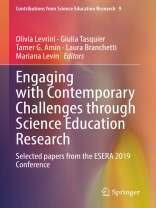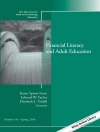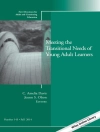This book starts with the premise that beauty can be an engine of transformation and authentic engagement in an increasingly complex world. It presents an organized picture of highlights from the 13th European Science Education Research Association Conference, ESERA 2019, held in Bologna, Italy. The collection includes contributions that discuss contemporary issues such as climate change, multiculturalism, and the flourishing of new interdisciplinary areas of investigation, including the application of cognitive neuroscience, artificial intelligence, and digital humanities to science education research. It also highlights learners’ difficulties engaging with socio-scientific issues in a digital and post-truth era. The volume demonstrates that deepening our understanding is the preferred way to address these challenges and that science education has a key role to play in this effort. In particular, the book advances the argument that the deep and novel character of these challenges requires a collective search for new narratives and languages, an expanding knowledge base and new theoretical perspectives and methods of research. The book provides a contemporary picture of science education research and looks to the theoretical and practical societal challenges of the future.
विषयसूची
Chapter 1. Beauty and pleasure of understanding – Words of Introduction (Igal Galili).- Part I: Meeting societal challenges.- Chapter 2. The white noise of climate change (Andri Snær Magnason).- Chapter 3. Prediction and adaption in Science|Environment|Health contexts (Albert Zeyer, Nuria Álvaro, Julia Arnold, Deidre Bauer, Iztok Devetak, Sonja Posega Devetak, Valentín Gavidia, Kerstin Kremer, Olga Mayoral, Tina Vesel Tajnšek, and Alla Keselman).- Chapter 4. Inquiry Based Learning and Responsible Research and Innovation: examples of interdisciplinary approaches at different schooling levels (Claudio Fazio, Amélia Branco, MojcaČepič, Cláudia Faria, Odilla E. Finlayson, Cecília Galvão, Luís F. Goulão, Eilish Mc Loughlin, Jerneja Pavlin, Dagmara Sokolowska, Wanda Viegas, Marisa Michelini).- Chapter 5. International perspectives on science education research in multicultural and multilingual contexts (Mariona Espinet, Sonya N. Martin, Alberto J. Rodríguez, Saouma Bou Jaoude, Audrey Msimanga).- Chapter6. Policy and pedagogy: International reform and design challenges for science and stem education (Richard A. Duschl, Doris Jorde, Eilish Mc Loughlin, Jonathan Osborne).- Chapter 7. PISA 2015: What can science education learn from the data? (Jonathan Osborne, Cory Forbes, Knut Neumann, Anja Schiepe-Tiska, Mylène Duclos, Florence Le Hebel, Andrée Tiberghien, Pascale Montpied, Valérie Fontanieu, Sara Dozier, Davide Azzolini, Nicola Bazoli, Loris Vergolini).- Chapter 8. Network analysis of changes to an integrated science course curriculum over time (Jesper Bruun, Ida Viola Kalmark Andersen, Linda Udby).- Part II: Expanding the evidence base.- Chapter 9. Developmental patterns of students’ understanding of core concepts in secondary school chemistry (Sascha Bernholt, Lars Höft).- Chapter 10. Learning evolution – A longterm case-study with a focus on variation and change (Martin Scheuch, Jaqueline Scheibstock, Heidemarie Amon, Gerald Fuchs, Christine Heidinger).- Chapter 11. What is city air made of? An analysis of pupils’ conceptions of clean and polluted air (Èlia Tena, Digna Couso).- Chapter 12. Undergraduates’ grasp of evidence for evaluating scientific knowledge claims associated with Socioscientific Issues (Won Jung Kim, Alicia Alonzo).- Chapter 13. Psychological patterns in chemistry self-concept: Relations with gender and culture (Lilith Rüschenpöhler; Silvija Markic).- Chapter 14. Undergraduate science majors’ identity work in the context of a science outreach program: Understanding the role of science capital (Alexandre Cavalcante, Allison J. Gonsalves).- Chapter 15. Pre-Service teachers’ psychological distance towards environmental and health Socio-scientific Issues (Alexander Georg Büssing, Jacqueline Dupont, Susanne Menzel).- Chapter 16. Self-efficacy of in-service secondary school teachers in relation to education for sustainable development: Preliminary findings (Athanasios Mogias, George Malandrakis, Penelope Papadopoulou, Costas Gavrilakis).- Part III: Developing innovative theoretical perspectives and methodologies.- Chapter 17. Where are we? Syntheses and Synergies in Science education research and practices (Bruce Sherin).- Chapter 18. Processes of Building Theories of Learning: Three Contrasting Cases (Andrea A. di Sessa, Mariana Levin).- Chapter 19. Understanding the role of image schemas in science concept learning: can educational neuroscience help? (Tamer G. Amin).- Chapter 20. Emotional engagement in the application of experimental activities withyoung childrens (Kellys Saucedo, Maurício Pietrocola).- Chapter 21. Crossing boundaries – Examining and problematizing interdisciplinarity in science education (Shulamit Kapon, Sibel Erduran).- Part IV: Designing research-based instruction.- Chapter 22. Augmented reality in lower secondary science teaching: teachers and students as producers (Birgitte Lund Nielsen, Harald Brandt).- Chapter 23. Visualisation and spatial thinking in primary students’ understandings of astronomy (Russell Tytler, Peta White, Joanne Mulligan).- Chapter 24. Discipline-based educational research to improve active learning at university (Daniele Buongiorno, Robert Harry Evans, Sergej Faletič, Jenaro Guisasola, Paula Heron, Marisa Michelini, Gorazd Planinšič, Paulo Sarriugarte, Alberto Stefanel, Kristina Zuza).- Chapter 25. Instructional activities predicting epistemic emotions in finnish upper secondary school science lessons: combining experience sampling and video observations (Elisa Vilhunen, Xin Tang, Kalle Juuti, Jari Lavonen, Katariina Salmela-Aro).
लेखक के बारे में
Olivia Levrini is Associate Professor in Physics Education and History of Physics at the Department of Physics and Astronomy of the University of Bologna, Italy. Her current research work concerns interdisciplinarity in STEM education, cognition and conceptual change, identity and processes of appropriation, instruction design on future-oriented STEM issues (climate change, artificial intelligence, quantum computing), educational reconstruction of advanced current topics in physics (thermodynamics, relativity, quantum physics). She served as Conference President at the 2019 ESERA conference.
Giulia Tasquier is Junior Assistant Professor in Physics Education at the Department of Physics and Astronomy of the University of Bologna, Italy. Her research interests include design and implementation of innovative teaching materials on modern physics and SSI; the correlation between knowledge and behaviour in climate change; the role of epistemological knowledge on models and modelling in teaching/learning physics; qualitative methods of data analysis; development of strategies, tools, and activities for transforming scientific knowledge into transversal skills about the future. She served as Conference Manager at the 2019 ESERA conference
Tamer Amin is currently Associate Professor of Science Education in the Department of Education and member of the Science and Mathematics Education Center at the American University of Beirut, Lebanon. His research focuses on conceptual change in science learning. He has been examining how the cognitive linguistic theory of conceptual metaphor can help uncover image schematic structures implicit in the language of science and how these can support and sometimes hinder learning scientific concepts. In a parallel line of research, he is investigating the challenges of teaching and learning science in the multilingual contexts of the Arab world and how these challenges might be overcome.
Laura Branchetti is a researcher in Mathematics Education at the Department of Mathematics ‘Federigo Enriques’ of Milan, Italy. She is a member of an interdisciplinary research group in physics, mathematics and computer science education in Bologna and she has been involved in European projects about STEM education and interdisciplinarity in preservice teacher training. Her main research interests concern mathematics education and interdisciplinarity in secondary school and at the transition from secondary to tertiary education; in particular she carried out research in the teaching of calculus and analysis and of the interplay between mathematics and physics.
Mariana Levin is Associate Professor of Mathematics Education in the Department of Mathematics at Western Michigan University. Her research focuses on understanding the role of knowledge and epistemic affect in moment-by-moment processes of reasoning and sense-making. Her edited volume “Knowledge and Interaction: A Synthetic Agenda for the Learning Sciences” (with A. A. di Sessa and N.J.S. Brown) explores this line of work, connecting insights from diverse research traditions on learning processes as they unfold in real-time in real-world contexts. Her current work explores the development of mathematical agency and autonomy in undergraduate students’ experiences in proof-intensive mathematics courses.












